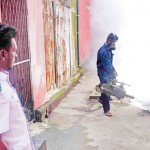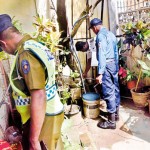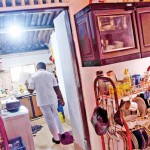News
Monsoon rains set stage for dengue outbreak in Colombo
View(s):By Hafsa Sabry
Colombo could face a potential dengue outbreak with the onset of monsoon rains.
The Health Ministry has announced a Dengue Prevention Week until June 1 to help contain the dengue mosquito.
Programmes were held in schools, public institutions, places of religious worship and new construction sites.
A report compiled by the Director of the National Dengue Control Unit highlights an increase in dengue cases, especially in the Colombo and Gampaha Districts. Control measures, including fogging and awareness campaigns, are being implemented, the report claims.
Dr. Indira Lingam, a medical officer of the National Dengue Control Unit, says that mosquito breeding was controlled during the last few months before the rain. However, when the rain started, an entomological survey found a potential risk of an outbreak. As a result, the department decided to carry out a special awareness programme, particularly in Colombo and Gampaha districts.
- Dengue prevention week saw fogging and inspection of areas in Colombo. Pix by Akila Jayawardena
The schools carried out special awareness programmes from the primary to the upper classes to educate students on how to prevent mosquito bites and reduce breeding sources. Items such as yoghurt cups, buckets, coconut shells, lids, or any containers in which water can collect provide breeding grounds for mosquitoes.
“There are no effective vaccines to fully control dengue. We use fogging and chemicals to kill mosquitoes. However, fogging is not very effective as it only kills adult mosquitoes in the environment. The real threat lies with the larvae. We need to kill the larvae, but it is better to reduce the breeding sources to prevent them from multiplying.”
“This is a crucial aspect of dengue prevention,’’ said Dr. Indira Lingam.
Awareness is being raised through programmes and visits of public health inspectors and Health Ministry officials.
In areas with many reported cases, people are advised to wear long-sleeve shirts and trousers during the daytime, as the dengue mosquito is active during the day.
In the meantime, a stronger chemical to kill larvae is being used around the places where most cases are reported. Known as Abate 500E, it is designed to treat standing water, ponds, lakes, woodland pools, catchbasins, marshes, swamps, polluted water, or areas with recurring mosquito populations. Some chemicals are available in the market, while others are not. But they are provided by the Ministry of Health.
The latest figures show a significant dengue outbreak, with a total of 83,258 cases.
High-risk areas include the districts of Colombo, Gampaha, Kalutara, and Galle, with significant case numbers in specific regions within each district.
The best way to say that you found the home of your dreams is by finding it on Hitad.lk. We have listings for apartments for sale or rent in Sri Lanka, no matter what locale you're looking for! Whether you live in Colombo, Galle, Kandy, Matara, Jaffna and more - we've got them all!




